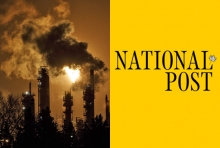March 14, 2024 | A growing number of premiers are urging the federal government to pause the carbon tax hike that's set to take place on April 1, or to ditch it altogether. Chris Ragan, the director of the Max Bell School of Public Policy at McGill University, joined Power & Politics to discuss the impact this could have on Canada's climate plan. "We're playing a long-run game," Ragan said. "It's very easy to say this is not a good time for a carbon tax ...

Here is the video recording of the 2023 Public Lecture.
The Bieler School of Environment presents:
Professor Gernot Wagner
2023 Environment Public Lecture
“Climate Risks, Uncertainties, and Opportunities"

A national survey of close to 1000 adults in Greenland (where approximately 90% of the population is Indigenous) conducted by a McGill University-led research team has found that a surprisingly large majority – 3 out of 4 Greenlanders – support extracting and exporting sand left by the melting ice sheet. A significant proportion want Greenland’s leadership to assess the impact of sand extraction and exports on both the environment and economy. Furthermore, when it comes to who mines the sand, the majority prefer local involvement to foreign collaboration.

Economic growth is often prescribed as a sure way of increasing the well-being of people in low-income countries, but a study led by McGill and the Institute of Environmental Sciences and Technologies at the Universitat Autònoma de Barcelona (ICTA-UAB) suggests that there may be good reason to question this assumption. The researchers set out to find out how people rate their subjective well-being in societies where money plays a minimal role, and which are not usually included in global happiness surveys.
« The European Union is in trouble. From the start, its countries haven’t been on equal footing. But COVID-19 has shone a stark light on the dissimilarities between its national economies. The crisis has also laid bare that EU members have significantly different views on what obligations they have to one another.

November 27, 2019 | In this opinion piece, it is argued how an escalating carbon price over the years accompanied by rebates, as shown by Chris Ragan, is the most transparent and the least costly for the economy and taxpayers.

November 27, 2019 | The Ecofiscal Commission says Canada will either have to raise carbon prices to $210 per tonne or adopt more expensive policies funded by higher income taxes to meet its 2030 targets.

November 27, 2019 | The Ecofiscal Commission's latest report says that if Canada were to meet its 2030 targets to cut greenhouse gas emissions through carbon pricing, it must more than quadruple its carbon tax and rebate the revenues to consumers.

If China is to achieve its target of 95% grain self-sufficiency by 2030 it will need to restrict the conversion of arable land to other uses say researchers from McGill. This may prove challenging in a country with a population of almost 1.4 billion, but with just under 13% of arable land, close to half of which is suffering from soil degradation. After analyzing the potential impacts of various current trade-related food policies, the researchers have arrived at the conclusion that the current Red Line arable land protection policy is insufficient to reach the government’s desired goal.

Montreal Gazette | Jan 25, 2015
BY: Rene Bruemmer
The Canadian committee of economists headed by McGill University economics professor Chris Ragan, are looking at ways Canada can follow the lead of other countries and start taxing pollution instead of jobs and profits, without hurting taxpayers or Canadian firms’ ability to compete internationally.
Read the full story here
